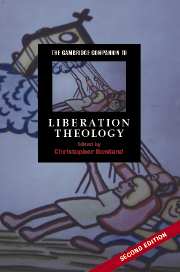Book contents
- Frontmatter
- Introduction: the theology of liberation
- Part I Contemporary Liberation Theology
- Part II Aspects of Liberation Theology
- Part III Analysis and Criticism
- 10 Liberation theology and the Roman Catholic Church
- 11 Marxism, liberation theology and the way of negation
- 12 The economics of liberation theology
- 13 Political theology, tradition and modernity
- 14 Globalising liberation theology: the American context, and coda
- Epilogue: the future of liberation theology
- Select bibliography
- Index
- Series list
13 - Political theology,tradition and modernity
from Part III - Analysis and Criticism
Published online by Cambridge University Press: 28 January 2008
- Frontmatter
- Introduction: the theology of liberation
- Part I Contemporary Liberation Theology
- Part II Aspects of Liberation Theology
- Part III Analysis and Criticism
- 10 Liberation theology and the Roman Catholic Church
- 11 Marxism, liberation theology and the way of negation
- 12 The economics of liberation theology
- 13 Political theology, tradition and modernity
- 14 Globalising liberation theology: the American context, and coda
- Epilogue: the future of liberation theology
- Select bibliography
- Index
- Series list
Summary
Dated from the Medellín Conference, liberation theology is not yet thirtyyears old. Political theology, by contrast, has many centuries behind it. Todefine a High Tradition the period 1100-1650 suggests itself: at one end theGregorian Reforms bring the conflict between papacy and secular rule to the centreof theological discussion; at the other the Moral Science of the earlyEnlightenment lifts political theory out of the purview of theology. The dates areespecially happy as they coincide with two striking contributions to the genre.From the turn of the twelfth century the anonymous York Tractates argue withtheological urgency for the sacral character of monarchy, discredited by the newpapalism. From the midpoint of the seventeenth century Hobbes' Leviathan, a work with considerably more theology in it thanphilosophy, seals the case, as early modernity understood it, for politics as anautonomous theoretical discipline. In between lie the great peaks of politicaltheology, scholastic and reformed. But the High Tradition itself did not springfrom nothing, but drew on thinkers and ideas of the patristic and Carolingianages. Augustine is rightly taken as a founding figure; but before him there wereAmbrose, Eusebius of Caesarea (notoriously), and from the pre-Constantinian periodLactantius. And why not mention the second-century Letter to Diognetus, which, inturn, was only building on ideas in 1 Peter and Philippians …?
But the relation of contemporary political theology to the High Tradition can besummed up in a single bleak word: ignorance. The feeling of invigorating newdeparture is due in considerable measure to the loss of antecedents from our view.Occasionally our contemporaries seize on moments in the tradition and identifytheir importance: Boff has written on St Francis; and the authors of the SouthAfrican Kairos Document used the doctrine of tyrannicide fromJohn of Salisbury and St Thomas.
- Type
- Chapter
- Information
- The Cambridge Companion to Liberation Theology , pp. 265 - 277Publisher: Cambridge University PressPrint publication year: 2007
- 2
- Cited by

